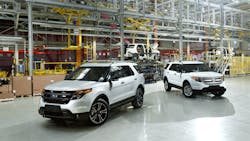First Ford Explorer SUV Rolls Off the Line in Russia
The first full-production Explorer rolled off the assembly line on April 11 at Ford Sollers Elabuga Assembly Plant in the Republic of Tatarstan for the Russian market.
Prior to this event, only partially assembled vehicles are imported from the home plant -- in this case, Ford’s Explorer plant in Chicago and then fully assembled at the local facility.
As demand for utility vehicles increases around the world, the Ford Explorer is being produced from the ground up outside of the United States for the first time in the iconic SUV’s history, Ford said.
Explorer sales in the U.S. rose 33% in March, marking the best monthly sales since the current model debuted in 2010.
Since the vehicle hit the market in 1990, Ford has sold nearly 7 million Explorers in the U.S.
Last year exports of the SUV increased nearly 65% from 2011, to more than 24,000 vehicles. Explorer was shipped to 64 countries including Canada, Mexico and Saudi Arabia.
In Russia, SUV sales accounted for 31% of the market in 2012, according to data from Russia’s AUTOSTAT market-research agency. In February, Ford Sollers sold more than 400 Explorers, a record in Russia.
Additionally, Explorer sales are scheduled to begin in China in the coming weeks.
“Russia is on its way to being the largest market in Europe and presents an enormous opportunity for growth,” said Ted Cannis, CEO of Ford Sollers. “We anticipate SUV sales to continue to grow as Russian customers prefer the image and performance these utility vehicles provide in severe weather and challenging road conditions.”
The Russia-made will be manufactured under the same process as the U.S. plant. “With our partner Sollers, we were able to take the best practices from Chicago Assembly Plant as well as our other SUV plants around the world, and combine them with our latest advances in the Ford Production System to ensure we achieved world-class quality and significantly reduced lead times of one to two years,” said John Fleming, executive vice president, Global Manufacturing and Labor Affairs.
The Ford Production System (FPS) -- which Ford starting rolling out in 2012 to its 65 plants worldwide -- improves flexibility, process and quality, investment efficiency and capacity utilization.
In Russia Ford was able to significantly reduce investment costs and accelerate tooling and equipment installations in the Elabuga plant by using existing tool designs from its global tool shops.
As production at Elabuga ramps up, Ford Sollers plans to hire an additional 500 employees to supplement the plant’s existing 1,500 employees. Chicago Assembly Plant will continue to produce Explorers for the U.S. and more than 60 other countries around the world.
